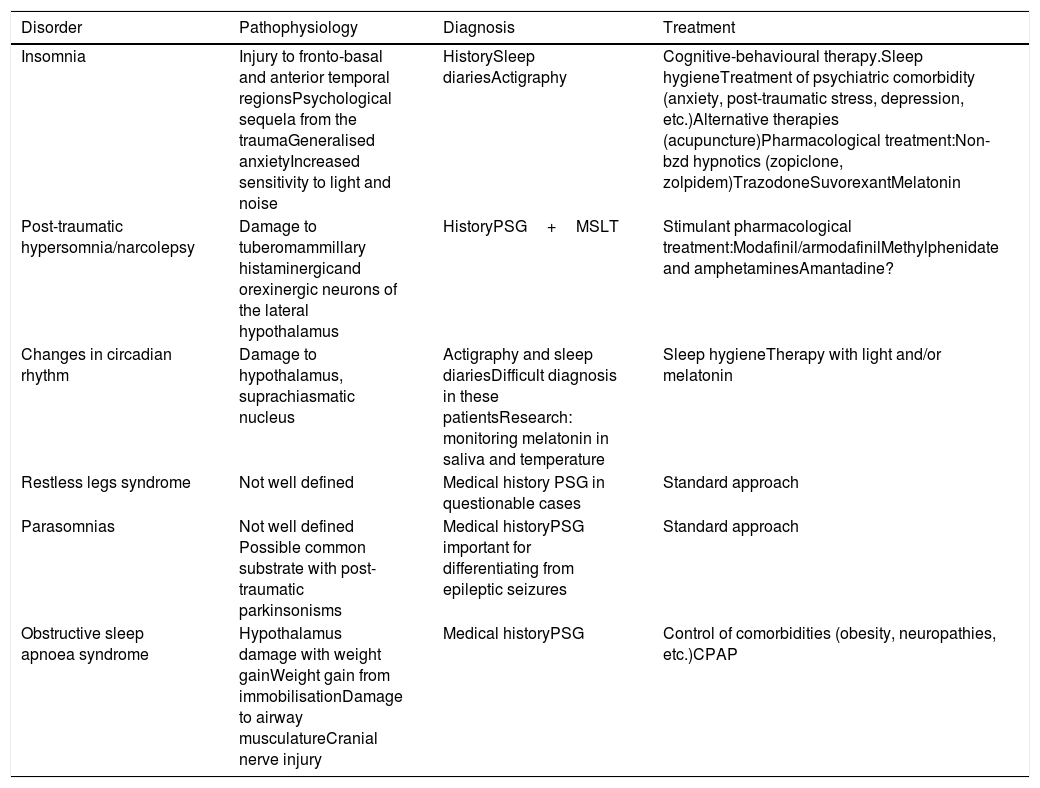The purpose of the review is to collect the most relevant current literature on the mechanisms of normal sleep and sleep disorders associated with traumatic brain injury (TBI), to discuss the most frequent conditions and the evidence on their possible treatments and future research.
Sleep disorders are extremely prevalent after TBI (30-84%). Insomnia and circadian rhythm disorders are the most frequent disorders among the population that has suffered mild TBI, while hypersomnolence disorders are more frequent in populations that have suffered moderate and severe TBI. The syndrome of obstructive sleep apnea and restless leg syndrome are also very frequent in these patients; and patients exposed to multiple TBIs (war veterans) are especially susceptible to sleep disorders. The treatment of these disorders requires taking into account the particularities of these patients.
In conclusion, diagnosis and treatment of sleep disorders should become part of routine clinical practice and cease to be anecdotal (as it is today) in patients with TBI. In addition, it is necessary to continue carrying out research that reveals the best therapeutic approach to these patients.
El propósito de la revisión es recopilar la literatura actual mas relevante sobre los mecanismos de sueño normal y los trastornos del sueño asociados al traumatismo craneoencefálico (TCE), discutir las afecciones mas frecuentes y la evidencia sobre sus posibles tratamientos y futuras investigaciones.
Los trastornos del sueño son extremadamente prevalentes tras un TCE (30-84%). El insomnio y los trastornos del ritmo circadiano son los trastornos mas frecuentes entre la población que ha sufrido TCE leve, mientras que los trastornos por hipersomnia son mas frecuentes en poblaciones que han sufrido TCE moderado y grave. El síndrome de apneas obstructivas del sueño y el síndrome de piernas inquietas son también muy frecuentes en estos pacientes; y los pacientes expuestos a múltiples TCEs (veteranos de guerra) son especialmente susceptibles a sufrir trastornos del sueño. El tratamiento de estos trastornos requiere tener en cuenta las particularidades de estos pacientes.
Como conclusión, el diagnóstico y tratamiento de los trastornos del sueño debería convertirse en parte de la práctica clínica habitual, y dejar de ser anecdótico (como es hoy en día) en pacientes con TCE. Además, es necesario continuar realizando investigación que nos revele cuál es la mejor aproximación terapéutica a estos pacientes.
Article

If it is the first time you have accessed you can obtain your credentials by contacting Elsevier Spain in suscripciones@elsevier.com or by calling our Customer Service at902 88 87 40 if you are calling from Spain or at +34 932 418 800 (from 9 to 18h., GMT + 1) if you are calling outside of Spain.
If you already have your login data, please click here .
If you have forgotten your password you can you can recover it by clicking here and selecting the option ¿I have forgotten my password¿.














